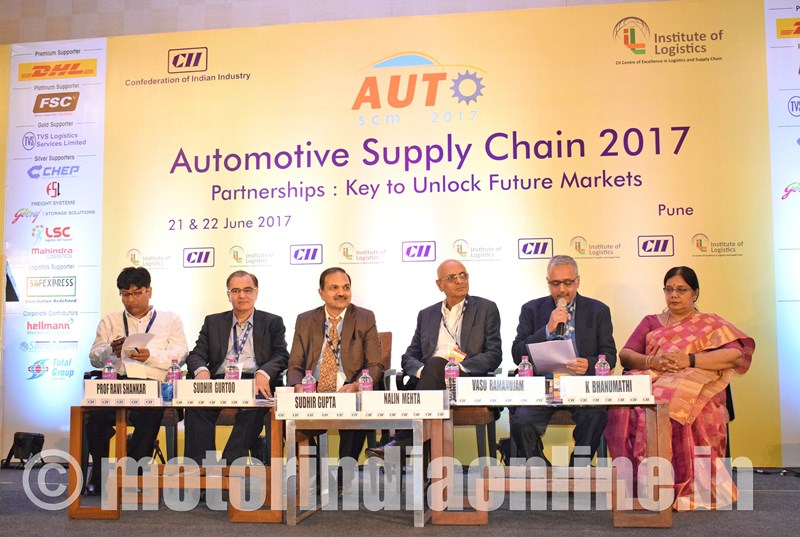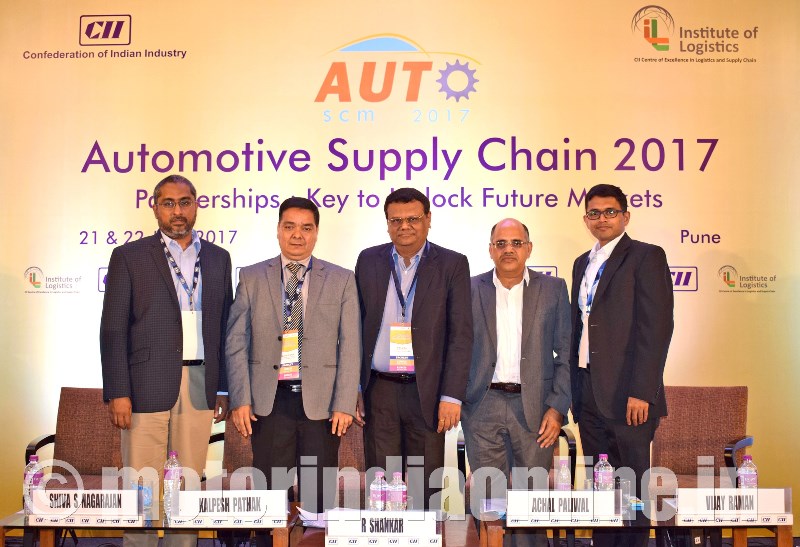The Confederation of Indian Industry, along with the Centre of Excellence in Logistics and Supply Chain, recently organized a two-day conference on ‘Automotive Supply Chain-2017’ in Pune, with the theme ‘Partnerships – Key to Unlock Future Markets’.

The conference got an overwhelming response with participants and delegates gelling over debates and discussions on the changing scenario of supply chain management in India. The collective mood of the conference was that the impact of GST and integrated logistics initiatives may lead to restructured automotive supply chains and thereby revisions in costs, service and performance of the sector.
Export and local demand will drive investments towards capacity development in the Indian auto sector. Moderators expressed their view that the increasing role of the Indian auto components sector in global markets and the growing competition in the Indian auto market are two factors that may reshape the auto logistics services market. Auto OEMs’ strategic alliances with global and local third-party logistics service providers and level of integration capabilities would continue to evolve.
The fast changing future market would call for redefining outsourcing baselines to select strategic logistics service providers (LSPs). Provision of critical real time analytical capabilities based on the OEM supply chain behaviour could distinguish logistics service providers from suppliers to strategic supply chain partners.
Competitive supply chain
In the inaugural session, Prof. Ravi Shankar & Group Chair – Operations and SCM, Department of Management Studies IIT Delhi, observed: “Supply Chain is on the verge of transformation. With GST, the industry will deal with the transition and even technological changes. The Indian automotive industry will become the 3rd largest in the world from the current 5th as per AMP 2016-26. This will happen with effective supply-chain utilization and strategies. Companies will not only compete on price but will compete based on their supply chain. So, companies must follow the path of partnerships, the theme of the event, for a stronger supply chain.”
Mr. Nalin Mehta, CEO & MD, Mahindra Truck and Bus Ltd., said: “Although the CV industry didn’t grow much last year, going by the GDP growth of 7.5 per cent we have to be optimistic given the fact that if a country produces and consumes things it has to grow. In the long run, the logistics sector will grow in complete alignment of the GDP growth. With GST coming in, the logistics manager will have to manage the stockyards not for tax efficiency but for logistics efficiency. Even the customer will buy trucks looking at productivity vis-a-vis the cost as the asset utilisation is likely to grow.”

Mr. Mehta also envisioned challenges for the supply chain managers as and when the customisation of product development enters the truck industry. “Trucks will be made as per customer’s demand and we will have to manage different engines, different types of gear boxes, different wheel bases and customize the trucks as per customer’s requirement. It is the logistics company that is going to help us manage the back end as there will be a lot of variants.”
He added that electric vehicles and 3D printing will create a challenge for LSPs. Since the batteries will be made somewhere else and the vehicle assembly in a different place, LSPs will have to collaborate and forge partnerships essential for a competitive supply chain.
Digitization in logistics
Mr. Sudhir Gurtoo, Managing Director of Leadec India, emphasized the role of data management and cloud computing. “Internet of things is already happening and machines communicate to each other. Augmented reality, touted as the next big trend in the supply chain industry, may just be happening. Just last year the international logistics company DHL developed and implemented smart glasses in warehouses, creating their own augmented reality which helped workers pick up and place things without any error,” he averred.
Growing experiments in the automotive sector such as autonomous driving, ride sharing and crowd sourcing models may disrupt the present operating business models. Adjustments in regulations, skill sets and standards would follow the success of such experiments. Auto OEMs’ challenges in outsourcing supply chain functions in the future would be augmented with areas such as integration of analytics into decision making, disruption scenario readiness and development of digital trust in supply chains.
On the same lines, Mr. Kalpesh Pathak, VP – Corporate SCM, FIAT India Automobiles Ltd., said: “Connect cars, autonomous vehicles and enterprise ecosystem is going to change. People may ask for vehicle insurance based on kms they drive. If the cars will be owned by companies, instead of individuals, hopefully the number of accidents will go down and people might not find the need to have Mediclaim policy. Buzz words like connected supply chain, digital manufacturing, connected service and maintenance and digital aftermarket will be in implementation. Industry 4.0 characteristics will continue to propel innovations in both the auto sector and the auto logistics services segment. The cumulative collaboration of information technologies and logistics services may redefine the automotive LSPs offerings in the near future.”
Mr. Shiva Nagarajan, Director, Sandilyam Automation Systems, highlighted the process efficiency and batch control that could be achieved by modern track and trace methodology. “Automatic Identification and Data collection happens through RFID, Biometric, Voice, OCR and Barcodes. Adapting to the latest barcoding system that does just more than verification will ease the handling of automotive components.”
There is no doubt that digitisation initiatives are essential for effective global auto supply chain partnerships. This factor may assume relatively higher weightage in the selection of auto logistics service providers and component suppliers.
Mr. R. Shankar, CEO, TVS Logistics Services Ltd., summarized aptly when he said: “New challenges such as successful implementation of emerging technologies and building trust among supply chain partners must be addressed. Digitisation risks must be compared with its rewards and LSPs have to build operating models not only around physical trust but also around digital trust.”
Mr. Vasu Ramanujam, Member, CII National Committee on Logistics and Senior Director, Entercorms, in his address, quoted from the famous Charles Dickens historical fiction – A Tale of Two Cities: “It was the best of times, it was the worst of times, it was the age of wisdom, it was the age of foolishness, it was the epoch of belief, it was the epoch of incredulity, it was the season of Light, it was the season of Darkness, it was the spring of hope, it was the winter of despair, we had everything before us, we had nothing before us, we were all going direct to Heaven, we were all going direct the other way – in short, the period was so far like the present period, that some of its noisiest authorities insisted on its being received, for good or for evil, in the superlative degree of comparison only.”